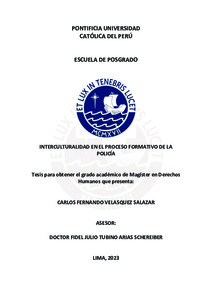| dc.contributor.advisor | Tubino Arias Schreiber, Fidel Julio | |
| dc.contributor.author | Velasquez Salazar, Carlos Fernando | |
| dc.date.accessioned | 2023-06-21T21:32:38Z | |
| dc.date.available | 2023-06-21T21:32:38Z | |
| dc.date.created | 2023 | |
| dc.date.issued | 2023-06-21 | |
| dc.identifier.uri | http://hdl.handle.net/20.500.12404/25249 | |
| dc.description.abstract | El ejercicio profesional de policía es una tarea dinámica que requiere un constante aprendizaje, para
hacer cumplir la ley y conservar la armonía ciudadana y así, poder legitimarse en comunidad.
La educación, es indispensable para quienes van a ejercer la función de oficiales de policía en su etapa
de formación. Ésta es multidisciplinaria y brinda especial atención en la protección de los derechos
humanos
individuales y colectivos de todas las personas
, considerando que la labor de policía se
legitima en cuanto actúa protegiéndolos y respetándolos.
Es de particular interés para este trabajo, el fortalecimiento de la intervención policial con respeto a
la diversidad plural del país, tratando el tema: Interculturalidad en el proceso formativo de la policía
(Velasquez, 2022), cuyo objetivo es desarrollar un estudio documental para, diseñar un modelo
educativo que consolide el enfoque de interculturalidad durante el proceso de formación de policías a
partir del año 2023 (Velasquez, 2022).
La participación cultural, el trabajo en equipo, el respeto mutuo, la inclusión y la solidaridad de las
personas integrantes de todas las comunidades que formamos parte del colectivo Perú, se presentan
en esta investigación para fomentar la ética —a partir de lo local— y promover un diálogo simétrico,
como fundamento esencial de la interacción entre culturas, desde una perspectiva global.
Para dar cumplimiento al propósito de la investigación se trabajó con un enfoque metodológico
documental, donde se analizó información diversa del tema seleccionado a través de un estudio
exploratorio del pensum de la escuela de oficiales de la policía nacional del Perú, cuya sistematización
permitió concluir que es oportuno replantearlo, para lograr la integración del tema de
interculturalidad, desde una perspectiva educativa sólida, relacionada al respeto, promoción y
protección de los derechos humanos. | es_ES |
| dc.description.abstract | The professional exercise of police is a dynamic task that requires constant learning, to enforce the
law and preserve citizen harmony and thus, be able to legitimize in the community.
Education is essential for those who are going to exercise the function of police officers in their
training stage. This is multidisciplinary and pays special attention to the protection of the individual
and collective human rights of all people, considering that the work of the police is legitimized as soon
as it acts to protect and respect them.
It is of particular interest for this work, the strengthening of police intervention with respect to the
plural diversity of the country, dealing with the topic: Interculturality in the training process of the
police, whose objective is to develop a documentary study to design an educational model that
consolidate the intercultural approach during the police training process from the year 2023.
Cultural participation, teamwork, mutual respect, inclusion and solidarity of the members of all the
communities that are part of the Peru collective, are presented in this research to promote ethics —
from the local— and promote a symmetrical dialogue, as an essential foundation of the interaction
between cultures, from a global perspective.
In order to fulfill the purpose of the investigation, a documentary methodological approach was used,
where various information on the selected topic was analyzed through an exploratory study of the
curriculum of the school of officers of the Peruvian national police, whose systematization allowed us
to conclude that it is opportune to reconsider it, to achieve the integration of the issue of
interculturality, from a solid educational perspective, related to respect, promotion and protection of
human rights. | es_ES |
| dc.language.iso | spa | es_ES |
| dc.publisher | Pontificia Universidad Católica del Perú | es_ES |
| dc.rights | info:eu-repo/semantics/openAccess | es_ES |
| dc.rights.uri | http://creativecommons.org/licenses/by-nc-sa/2.5/pe/ | * |
| dc.subject | Capacitación de la policía--Perú | es_ES |
| dc.subject | Interculturalidad--Perú | es_ES |
| dc.subject | Educación multicultural--Perú | es_ES |
| dc.subject | Derechos humanos--Perú | es_ES |
| dc.title | Interculturalidad en el proceso formativo de la policía | es_ES |
| dc.type | info:eu-repo/semantics/masterThesis | es_ES |
| thesis.degree.name | Magíster en Derechos Humanos | es_ES |
| thesis.degree.level | Maestría | es_ES |
| thesis.degree.grantor | Pontificia Universidad Católica del Perú. Escuela de Posgrado | es_ES |
| thesis.degree.discipline | Derechos Humanos | es_ES |
| renati.advisor.dni | 07729590 | |
| renati.advisor.orcid | https://orcid.org/0000-0002-3350-7428 | es_ES |
| renati.author.dni | 43634033 | |
| renati.discipline | 421837 | es_ES |
| renati.juror | Gamio Gehri, Gonzalo Eduardo | es_ES |
| renati.juror | Tubino Arias Schreiber, Fidel Julio | es_ES |
| renati.juror | Beltran Pacheco, Patricia Janet | es_ES |
| renati.level | https://purl.org/pe-repo/renati/level#maestro | es_ES |
| renati.type | https://purl.org/pe-repo/renati/type#tesis | es_ES |
| dc.publisher.country | PE | es_ES |
| dc.subject.ocde | https://purl.org/pe-repo/ocde/ford#5.03.01 | es_ES |







